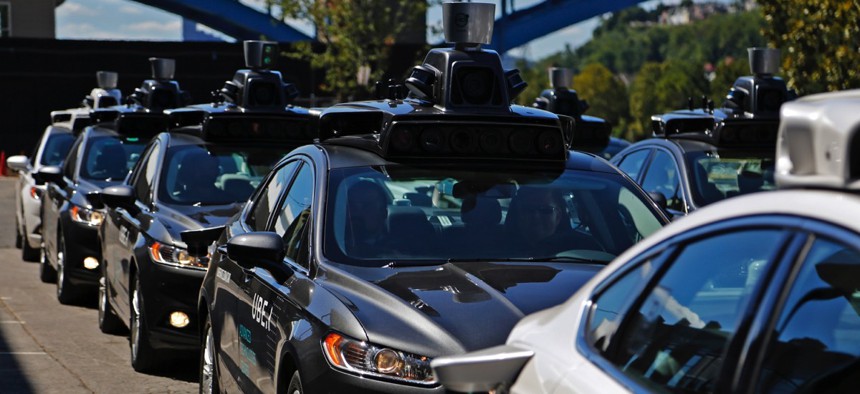Boston Has Plans for Autonomous Vehicle Testing by the End of 2016

A fleet of Uber's autonomous vehicles in Pittsburgh. Gene J. Puskar / AP Photo
That announcement comes as self-driving Uber vehicles hit the streets in Pittsburgh and as Columbus has proposed a network of driverless shuttles.
There are plans to test self-driving cars on Boston’s streets by the end of this year as part of a new city initiative focused on autonomous vehicles, the mayor’s office there said Wednesday.
The effort comes as the app-based ride-booking service Uber began offering rides with self-driving vehicles to customers in Pittsburgh this week and as Columbus, Ohio is in the early stages of a high-tech transportation program that includes plans for autonomous shuttles.
Mayor Martin J. Walsh’s office said Boston’s autonomous vehicle initiative would involve a year-long collaboration between the city and the World Economic Forum, a nonprofit foundation headquartered in Switzerland. Boston was selected as the lead partner city for the foundation’s City Challenge, which seeks to help cities prepare for future developments with transportation.
John Moavenzadeh, head of mobility industries at the World Economic Forum, said in a statement Wednesday that the city had “distinguished itself in the application process with its strong appetite and track record in civic innovation and some very thoughtful questions."
Through the program, the city will work with the World Economic Forum, the state of Massachusetts, the Boston Consulting Group, other cities, and industry representatives to come up with policy recommendations for self-driving vehicle technology.
A spokesperson for Walsh’s office said in an email Wednesday that the city and the World Economic Forum were in talks with “many businesses” that might have a role in the initiative, but she declined to identify any of them or to say whether Uber would be involved.
The mayor’s office also said it could not say how much the program would cost the city until further planning has been completed.
"With our start-ups and educational institutions, Boston is a leader in technology, robotics and innovation. Together with our partners, we know the City of Boston is ready to lead the charge on this transformative technology,” the mayor said in a statement.
But in comments made to reporters, he expressed a hint of uncertainty about self-driving vehicles.“I’m not even sure I know what I want to see happen here. I just can’t imagine a day in which people aren’t driving themselves. I just can’t,” he said, according to The Boston Globe.
In Pittsburgh, meanwhile, Mayor Bill Peduto ordered a ride Wednesday in a self-driving Uber. Peduto traveled along with Subra Suresh, president of Pittsburgh's Carnegie Mellon University. Autonomous vehicle research at the university dates back to the 1980s.
Though Uber’s self-driving cars in Pittsburgh can pilot themselves, the company has deployed human overseers with them to take the wheel in certain situations.
On Monday and Tuesday this week, U.S. Department of Transportation staff traveled to Columbus, Ohio to discuss the city’s Smart Columbus program. The program is slated to involve up to $140 million in investments in new transportation technology in the coming years.
Among the marquee projects planned as part of Smart Columbus is a network of self-driving electric shuttle vehicles, which will be capable of carrying up to 12 passengers along three fixed routes in a part of the city where there are retail stores, commercial buildings and warehouses.
Bill Lucia is a Reporter with Government Executive's Route Fifty and is based in Washington D.C.
NEXT STORY: LinkNYC cuts off browsing on curbside kiosks






